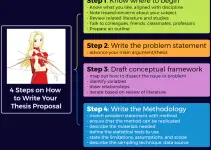One of the most difficult things associated with thesis writing is coming up with a good research topic. How can you generate one? What should you do? This article provides a simplified approach to this common concern of those new in the field of research.
You may find writing the literature review confusing, and feel that you don’t know where to start, as this part of research writing requires familiarity with the research topic being investigated. Familiarity will not happen unless you have read a great deal about what work or progress has been done to shed light to or understand why things happen the way they do, which in science is referred to as a phenomenon.
The ultimate aim of a review of literature is to provide background information about a phenomenon using existing relevant and reliable or credible literature. Scientists attempt to explain phenomenon, which, as expected, will always show a dearth of information on some aspects and fall short of your expectations. Along the way, as you examine the literature, there will always be questions in your mind, which you try to resolve by reading more – hoping that there will be answers to your questions somewhere. In the end, you will find yourself still looking for answers to your set of questions but find nothing that addresses your curiosity. Have you read enough? There’s a possibility that you might have not read everything, that there may be some literature that you have missed somewhere, somehow.
So, when should you stop reading relevant literature and conclude that indeed you have reached that point where you are convinced that no one has ever done anything or failed to answer adequately the questions that you have in mind? How can you ensure that you have exhausted available literature such that you are able to declare that there is a GAP in knowledge, and come up with your unique research topic? In reality, this is not an easy task, especially if you are new to the field of inquiry you are in.

This is the reason scientists specialize or stick to a particular study, research endeavor, or research topic for many years, trying to synthesize all work and fill in the gaps that will help explain phenomenon. The idea is to bring together all work there is available for scrutiny and get useful insights and hindsights – what has been done and what has been left undone. These initiatives should be made known to everyone concerned through peer-reviewed publications. Why peer-reviewed? That is because, persons working along those lines of inquiry will recognize that indeed, what you are doing is something that they do not know about and which they would want to know.
For all intents and purposes then, your gauge in saying that there is a GAP in knowledge, is to read the work of those scientists or researchers who are recognized authority on those research topics you want to explore. These scientists or researchers publish their findings in reputable scientific journals. What they are saying or have done so far, will serve as benchmark or springboard for further inquiry.
How will you know that a person is knowledgeable or the authority on a certain topic of inquiry given that you are new in that field? Well, one way to do so is to see if he has other research papers on the same topic available for examination, or probably see his credentials. After all, those in authority in a given field are those who can convince everyone that what he is doing, his arguments, are the most sensible explanation of a phenomenon. But if you have a better idea, then show your evidence. Who knows, your suggestions or propositions are better than anyone else’s.
© 2014 February 8 P. A. Regoniel


When somerone writes an piece of writing he/she retains the thought off a user in his/her mind that how a user can understand it.
Therefore that’s whyy this paragraph is perfect. Thanks!